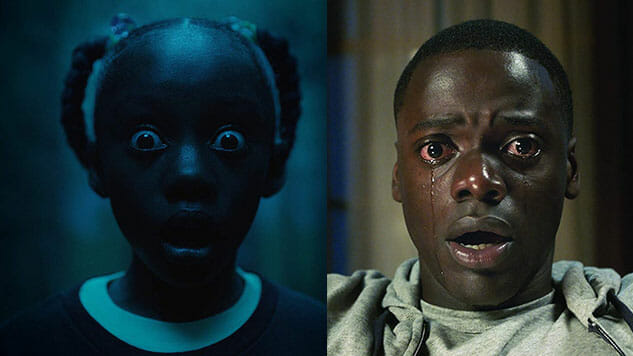The Fearful Symmetry of Us
Jordan Peele "elevates” horror by descending into the underworld.

Be sure to check out Paste’s review of Us by Dom Sinacola. The following contains major spoilers.
The people at the door never say anything, but the child, who has not always lived in the room, and can remember sunlight and its mother’s voice, sometimes speaks.
“I will be good,” it says. “Please let me out. I will be good!”
They never answer. — “The Ones Who Walk Away from Omelas,” Ursula K. Le Guin
It’s a joy unparalleled to watch a new artist’s distinctive style as it’s emerging. With Us, comedy-sketch-writer-turned-horror-director Jordan Peele manages to create another deeply disturbing thriller with the same perfectly timed gallows humor, eye for unforgettable imagery and skillful mythmaking as his (also extremely good) Get Out (2017), while somehow looking nothing at all like it.
I complain time and again about Hollywood’s reluctance to give us a diversity of experience, as legions online scream about any inclusion of female leads or people of color at the center of a story being pandering or box-checking, so it is gratifying that Us manages to both prove my point about the value of storytelling from a new perspective and debut as the number one movie in America.

The online discourse surrounding Us is in the midst of a backlash against characterizing the movie as “elevated horror,” justly reminding horror fans that an important and diverse genre is typically viewed with disdain even when there are just as many eyerollingly terrible dramas in theaters.
In Peele’s case, “elevated” is a particularly puzzling designation when his movies are based so firmly in the idea of a sinister underworld, out of sight and mind but always a danger. Get Out gave viewers “the Sunken Place,” a dark void of a prison in which the prisoner is powerless in their own hijacked body. Chris (Daniel Kaluuya) is hurled into that underworld after a slow build up that explicitly paints him and earlier cold-open victim Andre (LaKeith Stanfield) as prey using the same cinematic grammar as decades of slasher films. The awkwardness, the feeling of not belonging in the Armitage household even as he keenly senses the malevolence behind their smiles, is as much a weapon of Chris’s captors as the drugs and hypnosis.
That theme of being cast into darkness—of being shoved under into a place of powerlessness and despair, forgotten—reaches its zenith (or perhaps its nadir) in Us, Peele’s statement on not just race but on particularly American ideas of disenfranchisement and othering. It is not merely for simple exposition that the film begins with text explaining that thousands of miles of tunnels run beneath the United States, abandoned and bereft of purpose.

-

-

-

-

-

-

-

-

-

-

-

-

-

-

-

-

-

-

-

-

-

-

-

-

-

-

-

-

-

-

-

-

-

-

-

-

-

-

-

-









































